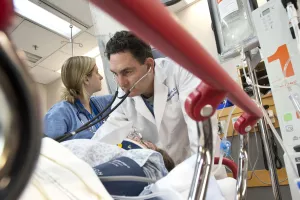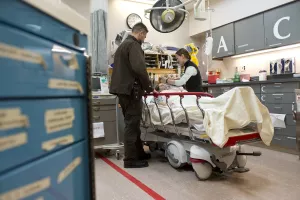Our emergency doctors are the best at what they do. They’re specially trained to use the newest technology to give quick, life-saving care. Whether it’s a broken bone, chest pain or a serious injury, we’re here for you and your family when you need us most.
24/7 emergency care
We know that no one wants to end up in the Emergency Department, but it's always good to be prepared. Our team is available 24/7, so you can feel confident knowing you’re in good hands. If you experience any of the following symptoms, please call 911 right away:
- Chest pain
- Difficulty breathing
- Severe burns
- Sudden slurred speech
- Uncontrolled bleeding
- Thoughts of harm or suicide
We provide expert care for all your health needs, including trauma, pediatric, geriatric and OB emergencies. Whether you need heart care, help with a broken bone, treatment for an ENT issue or mental health support, we’ve got you covered. With our skilled team and advanced equipment, we’re committed to giving you the best care possible. Your safety and well-being are our top priorities.

Emergency care for you
As a Level III Trauma Center, our emergency medicine and surgical specialists are available around the clock to provide care for patients experiencing serious acute illness and traumatic injuries. Emergency departments are located at our main campus and Saints Campus, where we offer the following specialized care:
- Pediatric Emergency Department: Our designated Pediatric ED is especially equipped to treat patients from birth to 21 years old. We specialize in pediatric pain management, child-friendly devices for IVs, blood draws, wound treatments and procedural sedation. Our waiting space includes child-friendly activities and private rooms to help calm and comfort our young patients.
- Obstetric Emergency Department: Located within our Labor and Delivery unit, we offer emergency care for pregnant persons with obstetrical concerns and delivery-related issues for those who are several weeks postpartum. We provide the highest quality care for you and your baby while reducing wait time and anxiety.
- With a helipad adjacent to the ambulance entrance, our emergency personnel can quickly transport trauma patients to and from the hospital — and, when necessary, to and from Tufts Medical Center in downtown Boston — within minutes.
If you're faced with a serious medical emergency, you can count on us to respond quickly and deliver advanced life support (ALS) and paramedic services. Lowell General Hospital Paramedics serve the city of Lowell and neighboring towns like Chelmsford, Dracut, Dunstable, Tewksbury, Tyngsborough and Westford. They log over 10,000 calls a year and have undergone 2,200 hours of classroom and clinical training that qualifies them to perform ALS measures like CPR and intubation.
Our Level III Trauma Center is staffed by emergency medicine and surgical specialists who are available 24/7 to care for patients experiencing acute illness and traumatic injuries.
From heart attacks and strokes to broken bones and pediatrics — we are here to meet your needs when an emergency strikes. On-site emergency diagnostic services are available, including MRIs, CT scans, X-rays and laboratory testing.
When emergency cardiac care is needed, we are the only hospital in the area that offers an on-site emergency cardiac catheterization lab (a procedure that opens blocked arteries) saving time and limiting damage to the heart.
Our full-service emergency department offers a Level I Adult Trauma Center, pediatric emergency department and express care for any emergency. Our board-certified emergency physicians and emergency room nurses have years of experience and training in pediatrics and emergency medicine.
- Geriatric Emergency Department: We are the first hospital in New England to receive a Level I Geriatric Emergency Department Accreditation (GEDA) – providing the highest level of excellence in care for adults aged 65 and older.
- Pediatric Emergency Department: We understand that a visit to the emergency room is scary enough for a child without being exposed to adults who are injured, sick or experiencing significant trauma. That’s why our Pediatric Emergency Department is operational 24 hours a day, 7 days a week, complete with a play area waiting room and 5 dedicated patient rooms. It’s a soothing, healing environment just for kids.
Conditions
Our specialists are here to treat a wide range of conditions, from heart attacks and strokes to broken bones and pediatric emergencies. Whatever your condition is, you can count on us to provide the highest level of care. Some of the most common conditions we treat include:
Fractures
Fractures are common, especially from sports or accidents where your body twists or collides with something. If the injury is severe, causes extreme pain or if the bone is exposed, seek emergency care immediately.
Heart attack
A heart attack happens when a blockage cuts off blood flow to the heart, causing damage in minutes. Early recognition can save a life. Call 911 if you or a loved one have any of these symptoms:
- Difficulty breathing
- Feeling of impending doom
- Lightheadedness or dizziness
- Nausea or vomiting
- Sudden collapse
- Sweating
- Pain down the arm, neck or back
Stroke
A stroke occurs when blood flow to the brain is cut off, which can quickly damage brain cells. Call 911 if you or someone else experiences:
- Trouble speaking or understanding speech
- Loss of balance or coordination
- Sudden blurred vision
- Sudden, severe headache (described as "the worst headache of my life")
- Weakness, numbness or paralysis on one side of the body
The faster you act, the better the chances for recovery.
Trauma
We are experts in treating serious injuries with the latest life-saving equipment. Our trauma team is known for providing top-notch care to critically injured or ill patients. We treat trauma from:
- Assaults
- Brain injuries
- Car accidents
- Falls
- Gunshot wounds
- Severe burns
- Stab wounds
Whatever the emergency, we're here to give you the care you need quickly and effectively.
Treatments
Our team of emergency medicine professionals is here to support you in your time of need. We understand that emergencies can be scary, but we are highly skilled in critical care, clinical emergencies and advanced heart care.
Our top priority is helping you feel better as soon as possible, so we collaborate closely with experts in a variety of medical specialties, including trauma surgery, general surgery, anesthesia, radiology, cardiology, internal medicine, OBGYN, pediatrics, neurology, orthopedics and more. Together, we will develop a personalized treatment plan tailored to your unique needs. You can trust us to provide the most comprehensive emergency care possible, with empathy and compassion every step of the way.
FAQs
If you or your family needs non-emergency care for minor issues like sore throats, earaches, rashes and minor cuts, you should contact your primary care physician (PCP). Your PCP knows your medical history and can best treat you and manage chronic conditions like asthma and diabetes. Usually, your doctor has a few appointments a day put aside for sick or urgent concerns, and because they know you, they want to provide you care when you're not feeling your best.
You should visit an urgent care center when you have a health issue and your primary care physician is unavailable. Urgent care treats non-emergency conditions.
Visit an emergency department if you need immediate care for an emergency condition. Call 911 immediately if you have a life-threatening situation, such as chest pain, severe bleeding, difficulty speaking or breathing, thoughts of self-harm or other major trauma.
A trauma center is a hospital unit specially equipped to care for people with the most serious and life-threatening injuries, including gunshots, burns and traumatic brain injuries. Massachusetts designates trauma centers as Level, I, II or III, based on standards from the American College of Surgeons:
- Level I trauma centers provide advanced treatment and specialized resources for critically injured patients. They conduct trauma research and have a surgical residency program. The Tufts Medical Center emergency department is certified as a level 1 trauma center.
- Level II trauma centers provide similar specialty medical services and resources, but do not require research and residency programs.
- Level III trauma centers care for patients with moderate injuries and can stabilize and transport severely injured patients to a higher-level trauma center. The Lowell General Hospital and MelroseWakefield Hospital emergency departments are certified as level III trauma centers.

From regular office visits to inpatient stays, find the healthcare you need and deserve close to home.